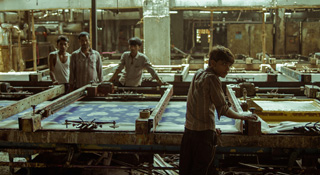Machines
 INDIA, GERMANY, FINLAND / 2016 / Hindi / Color / DCP / 71 min
INDIA, GERMANY, FINLAND / 2016 / Hindi / Color / DCP / 71 min
Director, Script: Rahul Jain
Photography: Rodrigo Trejo Villanueva
Editing: Rahul Jain, Yaël Bitton
Sound Design: Susmit “Bob” Nath
Re-Recording Mixer: Adrian Baumeister
Digital Colorist: Gregor Pfüller
Producers: Rahul Jain (Jann Pictures), Iikka Vehkalahti (IV Films), Thanassis Karathanos (Pallas Film)
World Sales: Autlook Filmsales GmbH
A giant spinning mill in India, a generator of extraordinary profits. It looks unremarkable on the outside, but go within and you find the factory transformed into a boundless forest of exploited labor. The camera forces its way past the mill’s outer veil and down into these depths. As observers, we find the sight of laborers caught in long shifts physically thrust upon us—their poor working conditions, and the sound of an alarm that never stops ringing, together with even the stifling smells and air of the place. Clever camerawork transcends the ugliness of this scene to rest upon a certain perhaps paradoxical “beauty,” at the same time vividly crystalizing for us the unjust labor relationships that lie at the base of global capitalism, and the harsh realities that govern the lives of migrant factory laborers, some of who are children.
[Director’s Statement] As a five-year-old boy I used to roam around in my grandfather’s now-defunct textile mill in Surat, in India’s Gujarat State. It was easy to get lost in the labyrinthine corridors. I was overwhelmed by the machines as a three-foot tall kindergartener. It was this sensation of being minuscule in front of the gigantic processing machines that took me back to a similar factory twenty years later–this time with a camera.
I remember in fragments getting lost in the long aisles of printing machines, enjoying the smell of coal in the factory’s boiler rooms, maybe because it was forbidden for me to be there in the first place.
A child’s perspective is motivated by height, but as an adult depth perception takes over. Seeing the world on an eye-to-eye level basis helped me sort out my inclinations well. We forget this in our everyday existential structures because these things are hidden from our immediate field of vision, and I wish to elucidate through the camera this simple eye-to-eye perspective we sometimes choose not to acknowledge. It’s easy to look away from things that make us uncomfortable so I set out to use cinema as a curatorial device to confront some of these things with a temporal patience.
Venturing into many factories I have gotten a sense of my class, my identity, in relation to the 1.3 billion Indians with whom I share my nationality. A good portion of the laborers don’t reveal their stories to me, probably due to my association with the owners. But a majority of them are able to open up past our immediate and social differences, revealing the circumstances that led them here. Young teenagers who started working in these factories when I was an infant are now middle-aged adults. Some of them seem to remember me by my first name. I have travelled the world back and forth many times over, as these workers have toiled away their complete existences in these factories of exclusion and alienation.
Food, housing, and fabric are the material necessities of existence. A factory functions within these interests built from a variety of human elements. There is one boss for some thousands of workers.
A lack of unionized labor in a densely populated, quickly accelerating economy leaves room for a lot to be left unseen, the deliberate overlooking of a multitude of human beings for the interests of a few. It is not just one factory, it’s a civilizational structure. The systems that allow this to happen are the ones that need collective acknowledgement.
 Rahul Jain
Rahul JainDirector and producer Rahul Jain is from New Delhi, and grew up in the Himalayas. He recently graduated with a Bachelors of Fine Arts in Film and Video from the California Institute of the Arts, and is presently pursuing a M.A in Aesthetics and Politics. He is interested in distance, otherness, and the everyday. Machines is his debut film.
